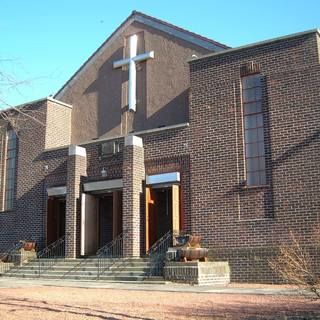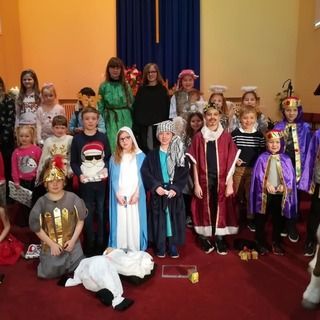☰
Glasgow Baillieston Mure Memorial
Baillieston
Glasgow City
G69 6LU
- Church of Scotland churches in Baillieston, Glasgow City
- Church of Scotland churches in Glasgow City
- Church of Scotland churches in United Kingdom
- Church of Scotland churches near me
- All churches in Baillieston, Glasgow City
Who we are
Glasgow Baillieston Mure Memorial in Baillieston, Glasgow City is a Christian congregation serving the Baillieston community and encouraging others through a life-changing Christian journey.
We seek to serve God by working for justice and peace, respect and learn from all the great faith traditions and desire to be known by the love we have for one another.
We seek to serve God by working for justice and peace, respect and learn from all the great faith traditions and desire to be known by the love we have for one another.
Church Address
Maxwell Drive
Garrowhill
Baillieston,
Glasgow City
G69 6LU
Garrowhill
United Kingdom
Phone: 0141 771 7699
Download Glasgow Baillieston Mure Memorial vCard with Service Times
Church Pastor
Rev. Sandra Black
Interim Minister
Maxwell Drive
Garrowhill
Baillieston,
Glasgow City
G69 6LU
Garrowhill
United Kingdom
Phone: 0141 773 1216
Download Interim Minister Rev. Sandra Black vCard
Quote of the Day
2 Peter 3:10
But the day of the Lord will come as a thief in the night; in the which the heavens shall pass away with a great noise, and the elements shall melt with fervent heat, the earth also and the works that are therein shall be burned up.
But the day of the Lord will come as a thief in the night; in the which the heavens shall pass away with a great noise, and the elements shall melt with fervent heat, the earth also and the works that are therein shall be burned up.
Denomination
Church of Scotland
Church of Scotland churches in Baillieston, Glasgow City, United Kingdom
Church of Scotland churches in Glasgow City, United Kingdom
Church of Scotland churches in United Kingdom
All churches in Baillieston, Glasgow City
Affiliations:
Website:
Social Media
Leadership
Leader Name:
Rev. Sandra Black
Leader Position:
Interim Minister
Formal Title:
Leader Address:
Tel:
Fax:
Leader Email:
Leader Bio:
Other Church Leaders:
Rev. Sandra Black on Social Media:
Glasgow Baillieston Mure Memorial Leadership Photos
Administration
Admin Name:
Admin Position:
Session Clerk
Admin Address:
Telephone:
Fax:
Admin Email:
Mailing Address
Driving Directions to Glasgow Baillieston Mure Memorial
Travel/Directions Tips
Parking
Glasgow Baillieston Mure Memorial Baillieston Service Times
Sunday 10 a.m. Family Worship Service
Service Times last updated on the 22nd of January, 2020
Service Times last updated on the 22nd of January, 2020
Worship Languages
Dress code:
Children and Youth Activities
Under 12s:
Under 18s:
Local outreach & community activities:
Other activities & ministries
Special Needs/Accessibility:
Prayers and hymns:
Main Bible:
Hymns and Songs:
Other information:
Average Adult Congregation:
Average Youth Congregation:
Additional Info:
Glasgow Baillieston Mure Memorial Photo Gallery
Glasgow Baillieston Mure Memorial History
Mure Memorial Church History
The Story of a Kirk
Below are extracts from a book which was written by David Duncan, our then Session Clerk, to mark the centenary in 1973.
"God moves in a mysterious way," the hymn-writer tells us. "His wonders to perform." While it might be regarded as presumption to imply that Mure Memorial Kirk was one of the wonders of God's world, it would not be untrue to say that the conditions in which the Mure Memorial Congregation had its beginnings were predestined when the coal and iron measures of the Central Lowlands of Scotland were laid down some three million years ago.
Had there been no iron ore in The Monklands, and had there been no coal seams to justify the sinking of some twenty-four pits in the vicinity of Crosshill - later to become known as Baillieston - there would have been no need of a Monklands Canal to provide a means of transporting heavy loads of iron ore and coal from The Monklands to Glasgow, that hive of industry, where demand for commodities was growing fast. Roads were little more than rutted, muddy farm tracks, and such vehicles as were in existence were quite incapable of carrying the heavy loads involved.
This demand for iron ore and coal arose prior to the development of railways, and to the civil engineers of those days a canal was the only answer. The Monkland Canal was a very busy waterway at the peak of its usefulness. Barges, it is said, were almost nose-to-tail all the way from Coatbridge to Port Dundas. As the canal was the only means of east-west transport, it is hardly surprising that a village came into existence on the north bank of the Monkland Canal, just east of the point at which the present Easterhouse Road crossed the line of where the canal used to run. The village, locally known as "The Hole", was properly named West Maryston and comprised houses which were occupied mainly by miners. The derivation of the name, "West Maryston", is not clear but is thought to have arisen from the existence of a well, known as "Mary's Well", which was one time the source of water for the village. Local tradition has it that Mary, Queen of Scots, rested there and refreshed herself at this well.
West Maryston is described by some as "a hamlet", but reports by those who lived there have it that there were upwards of a thousand people dwelling in the area. Families were large-10 to 15 children being not uncommon, and the village was not confined to one row of dwellings along the bank of the canal.
At any rate, whether village or hamlet, had there been no West Maryston there might never have been a Mure Memorial Kirk, for it was in this village of West Maryston that a small group of people, believing strongly in Free Church principles, resolved to establish a place of worship convenient to their locality. This dedicated group held its first Divine Service in a rented hall in the mining village of West Maryston on Sunday, the sixth day of September, in the year eighteen hundred and seventy-three.
It was known at its beginning as "Baillieston Free Church"; later as "The Miners' Church"; as "The Children's Church"; as "The Iron Kirk"; as "Mure Memorial United Free Church, Baillieston" and now as "Baillieston Mure Memorial".
The Story of a Kirk
Below are extracts from a book which was written by David Duncan, our then Session Clerk, to mark the centenary in 1973.
"God moves in a mysterious way," the hymn-writer tells us. "His wonders to perform." While it might be regarded as presumption to imply that Mure Memorial Kirk was one of the wonders of God's world, it would not be untrue to say that the conditions in which the Mure Memorial Congregation had its beginnings were predestined when the coal and iron measures of the Central Lowlands of Scotland were laid down some three million years ago.
Had there been no iron ore in The Monklands, and had there been no coal seams to justify the sinking of some twenty-four pits in the vicinity of Crosshill - later to become known as Baillieston - there would have been no need of a Monklands Canal to provide a means of transporting heavy loads of iron ore and coal from The Monklands to Glasgow, that hive of industry, where demand for commodities was growing fast. Roads were little more than rutted, muddy farm tracks, and such vehicles as were in existence were quite incapable of carrying the heavy loads involved.
This demand for iron ore and coal arose prior to the development of railways, and to the civil engineers of those days a canal was the only answer. The Monkland Canal was a very busy waterway at the peak of its usefulness. Barges, it is said, were almost nose-to-tail all the way from Coatbridge to Port Dundas. As the canal was the only means of east-west transport, it is hardly surprising that a village came into existence on the north bank of the Monkland Canal, just east of the point at which the present Easterhouse Road crossed the line of where the canal used to run. The village, locally known as "The Hole", was properly named West Maryston and comprised houses which were occupied mainly by miners. The derivation of the name, "West Maryston", is not clear but is thought to have arisen from the existence of a well, known as "Mary's Well", which was one time the source of water for the village. Local tradition has it that Mary, Queen of Scots, rested there and refreshed herself at this well.
West Maryston is described by some as "a hamlet", but reports by those who lived there have it that there were upwards of a thousand people dwelling in the area. Families were large-10 to 15 children being not uncommon, and the village was not confined to one row of dwellings along the bank of the canal.
At any rate, whether village or hamlet, had there been no West Maryston there might never have been a Mure Memorial Kirk, for it was in this village of West Maryston that a small group of people, believing strongly in Free Church principles, resolved to establish a place of worship convenient to their locality. This dedicated group held its first Divine Service in a rented hall in the mining village of West Maryston on Sunday, the sixth day of September, in the year eighteen hundred and seventy-three.
It was known at its beginning as "Baillieston Free Church"; later as "The Miners' Church"; as "The Children's Church"; as "The Iron Kirk"; as "Mure Memorial United Free Church, Baillieston" and now as "Baillieston Mure Memorial".
Glasgow Baillieston Mure Memorial Historical Photos
Page administrator:
Contact Email:



